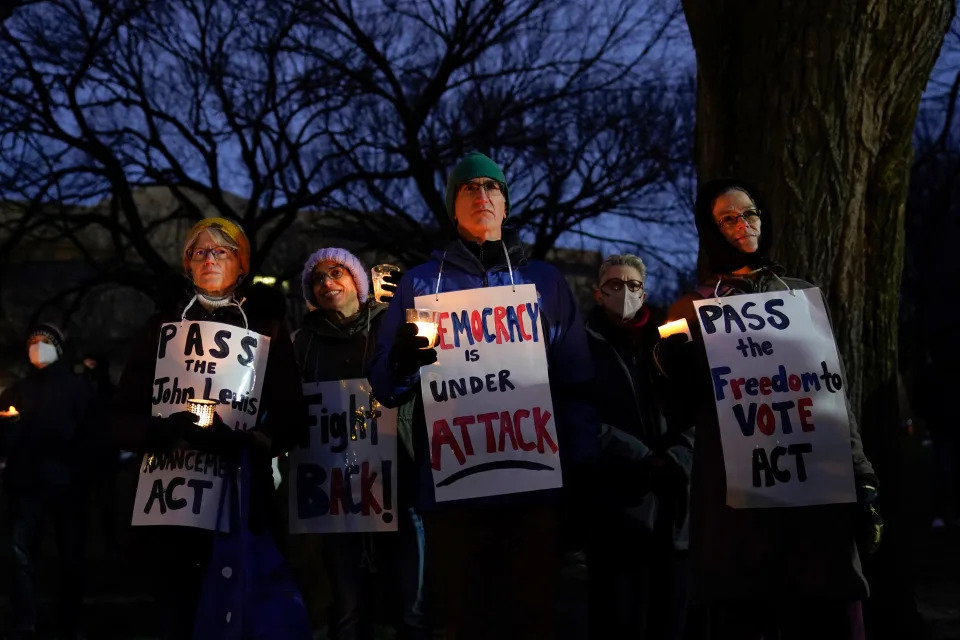Daily Beast
How the QAnon Crazies Went From Comet Pizza to the National Butterfly Center
Eleanor Clift – February 9, 2022

The National Butterfly Center, in Mission, Texas, was forced to close indefinitely after Kimberly Lowe, a fringe congressional candidate running in a GOP primary in Virginia, visited the site with hopes of uncovering a child sex-trafficking hub.
Denied entry based on her trail of inflammatory Facebook posts, Lowe became belligerent. A war of words and a physical altercation with the center’s director followed. Soon after, right-wing media featured video from outside the center’s gates alleging “credible threats of the cartels trafficking children through the butterfly center.”
The false claims follow the same script as the Pizzagate conspiracy theory in 2016, when Democrats were falsely accused of abusing children and holding them captive in the basement of Comet Ping Pong, a pizzeria in upscale northwest Washington, D.C. that doesn’t have a basement. But proving or debunking a conspiracy theory isn’t the point.
Crisis and Opportunity Could Lead to a Biden Bounce Very Soon
The point is to inflame and excite a Republican base that flirted with (or openly embraced) the QAnon conspiracy theory alleging a Deep State cabal of Democratic-Satanic pedophiles—and has focused its energy on trying “Stop the Steal” of a legitimate election that didn’t go their way.
Multiple conspiracy theories spawned by rage and grievance are coming together in a powerful and frightening GOP coalition.
“Far-right candidates like Kimberly Lowe have a blueprint on how to ride conspiracy theories and extreme rhetoric to office,” Kristen Doerer, managing editor of Right Wing Watch, said in an email. “They only have to look to Marjorie Taylor Greene, Lauren Boebert or Madison Cawthorn—all of whom have become MAGA celebrities—and see that’s a winning strategy.”
Harassing butterfly conservationists is cowardly enough, but for extremists looking for role models, Greene is hard to top. She harassed David Hogg, a survivor of the high school school shooting in Parkland, Florida, in 2018, suggesting the shooting that took 17 lives was a false flag.
“They are not just conspiracy theorists. They’re movements, they’re networks, and they span across multiple social media platforms,” Doerer told The Daily Beast. “These conspiracy theorists became valuable for the Republican Party because they can spread the Republican Party’s message whatever that might be throughout their networks. One only has to look at the cavalcade of conspiracy theorists traveling the country for the ReAwaken America Tour to see how large this network has become.”
The confluence of events that led to closing the butterfly sanctuary did not begin or end with Lowe’s visit. An account in The New York Times describes the escalation and the involvement of familiar figures like ex-Breitbart boss and Trump White House senior adviser Steve Bannon and Former Trump national security adviser Michael Flynn.
The 100-acre site along the Rio Grande is near the path of the promised wall that helped elect Trump, and its construction remains a magnet for his supporters. Bannon raised money to pay for the wall when Congress wouldn’t. He was charged with fraud for absconding with the money. Trump pardoned him. Flynn recently spoke at a rally in support of the wall in nearby McAllen, Texas, where protesters with long guns held vigils.
Adam Klein is an associate professor of Communication Studies at Pace University, whose most recent book is Fanaticism, Racism and Rage Online. He told The Daily Beast that he listened to Bannon’s podcast the previous week recounting his version of the events at the butterfly center. The episode was titled, “Sex Slaves at the Border,” fueling the conspiracy theory swirling around the butterfly center.
Many modern right-wing conspiracy theories draw on the same storyline—which is that liberals and elites and Democrats are depraved. What is devilishly different about the butterfly center conspiracy is “marrying it to another valuable currency, anger at the border,” says Klein. He calls it “old poison in a new bottle.”
Jared Holt, a resident fellow at Atlantic Council who follows digital extremism, said his first reaction to the butterfly center’s closing was “sad to see this happen again. Conspiracy theories about this place have been floating around since 2017.”
Proximity to the wall’s construction path thrust the center into the fray, combined with rhetorical excesses on the right where opponents “are not just disagreeing but acting nefariously and are part of a larger conspiracy,” said Holt. Toss in vile accusations of sex-trafficking, which is universally reviled, “and the people who believe these conspiracy theories then place themselves in a heroic bulwark position, so in their minds they are combating these evils head on.”
The Jan. 6 Committee Members Are Patriots Making Sure Treason is Fully Documented
Monitoring this culture of true believers motivated by baseless conspiracy theories, Holt says that “any lasting solution will have to include very clear line drawings from influential Republican figures who state that this kind of behavior is unacceptable and that it is false. No amount of news media or statements from Democrats will make a difference. Until people who are politically aligned are able to speak to them and they listen, it’s going to be an uphill battle.”
With the midterms looming and control of Congress in the balance, there are few profiles-in-courage within the party whose members parrot conspiratorial theories like the Big Lie to placate Trump.
“This conspiratorial wing has gained so much sway that we’ll see more politicians catering directly to it, and that means we’re going to get more Marjorie Taylor Greenes,” says Holt. And if you’re thinking the voters will reject these extremists, “Jewish spaceships weren’t too much for her constituents,” he notes, referring to Greene’s widely ridiculed claim that Jewish space lasers caused California’s wildfires.
As for the butterfly center, the director has taken to carrying a sidearm, telling The New York Times that her board of directors won’t like it but the people attacking the center “need to know they’re not the only ones who carry weapons.”







